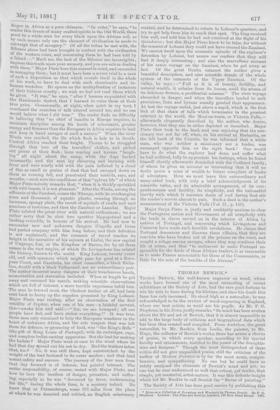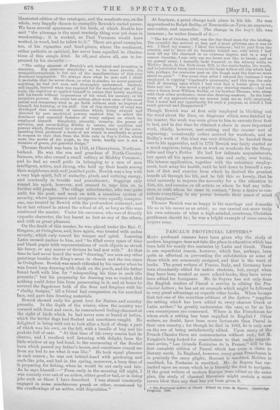THOMAS BEWICK.*
THOMAS BEWICK, the well-known engraver on wood, whose works have formed one of the most interesting of recent exhibitions at the Society of Arts, had the rare good-fortune to win his title to fame during his lifetime, and since his death this fame has only increased. Ho stood high as a naturalist; he was acknowledged to be the reviver of wood-engraving in England, where our best artists in wood. are his pupils. As Mr. F. G. Stephens, in his Notes, justly remarks," So much has been written about the life and art of Bewick, that it is almost impossible to add to the large body of criticism and biographical data which has been thus created and compiled. From Audubon, the great naturalist, to Mr. Ruskin, from Leslie, the painter, to Mr. Hugo, the collector of Bewick's works, there has arisen a chorus of praise, in which every speaker, according to his special faculty and attainments, testified to the power of the draughts- man and designer." Though the most distinguished of these critics did not give unqualified praise, still the criticism of the author of Modern Painters is by far the most acute, compre- hensive, and sympathising. No one but lie could have so subtly analysed the elements of Bewick's mind and art; no one but he ever understood so well that robust, yet tender, that simple, yet masterful, artist-nature. It was this delicate insight which led Mr. Ruskin to call Bewick the " Burns of painting."
The Society of Arts has done good service by publishing this
* Notes on a Collection of Drawings and Woodcuts by Thomas Bowiele. By F. G. Stephens. Loudon : The Fine-Art Society, Limited, 148 Now Bond Street. MB.
illustrated edition of the catalogue, and the woodcuts are, on the whole, very happily chosen to exemplify Bewick's varied power.
We have several specimens of his birds, of which Ruskin has said "the plumage is the most masterly thing ever yet done in woodcutting ; it is worked, as Paul Veronese would. have worked, in wood, had he taken to it." There are good examples, too, of his vignettes and head-pieces, where the sentiment, either pathetic or satirical, has never been equalled in illustra- tions of this simple kind. In all, and above all, one is im- pressed by his sincerity :—
" The ruling element of Bewick's art, technical and inventive, is sincerity. His extreme simplicity, or, to be more precise, his straightforwardness, is but ono of the manifestations of this ever dominant inspiration. Ho always drew what he saw, and 1 think it probable that he never drew, or what is similar, he never painted, anything he had not Been and thoroughly understood. Entirely self-taught, beyond what was required for the mechanical use of his tools, the engraver so applied himself to nature that hardly anything left his hands without impressions of hie mind, his memory, or his inventive powers. He could but seldom allow work even of the most trivial and temporary kind to go forth without such an imprint of himself, his learning, or his skill. Out of this sincerity of mind was developed that veracity of execution which, being swayed and directed by rare analytical powers, enabled him to select the dominant and essential features of every subject on which he employed himself. Simplicity, sincerity, veracity, the power of selection, and never-failing fidelity to nature, are qualities and powers which, illustrated by a souse of homely beauty of the corm- spending kind, produced a mode of art which is manifestly so great in respect to shjlo that, from the little cuts in Gay's Fables, which wore the works of his youth, to the birds, hardly one is not a treasure of grave, yet graceful design."
Thomas Bewick was born in 1753, at Cherryburn, Northum- berland. He was the son and grandson of North-Country farmers, who also owned a small colliery at Mickloy Common ; and he had no small pride in belonging to a race of men intelligent, active, and strong, who hold up their heads among their neighbours with well justified pride. Bowick was a boy with a very high spirit, full of audacity, pluck, and untiring energy, and constantly in trouble and punishment ; floggings only roused his spirit, however, and seemed to urge him on to further wild pranks. The village schoolmaster, who was quite unfit for his post, and went on with a senseless system of severity, where ignorance and arrogance were equally conspicu- ous, was treated by Bewick with the profoundest contempt; and he at last refused to attend the school at all, as long as this man continued the master. Under his successor, who was of directly opposite character, the boy learnt as fast as any of the others, and with as great pleasure.
On the death of this master, he was placed. under the Rev. C. Gregson, at Ovingham, and, here again, was treated with undue severity, which only roused his temper and spirit. Learning Latin seemed useless to him, and "he filled every space of time and blank paper with representations of such objects as struck his fancy, or any scones or devices he had met with." At that time he had never heard the word. "drawing," nor seen any other paintings besides the King's arms in church and the inn signs in Ovingham. Bewick was much ridiculed by his master when he was found. busy drawing with chalk on the porch, and his father found fault with him for " misspending his time in such idle pursuits ;" but his propensity for drawing was so rooted, that nothing could deter him from persevering in it, and at home he covered the flagstones both of the floor and fireplace with his " chalky designs," till a friend had compassion on his scorched face, and gave him drawing materials.
Bewick showed early his great love for Nature and country pursuits. In the depth of the winter, when the country was covered with frost and snow, he remembered feeling charmed at the sight of birds which he had never seen or heard of before, which the terrier dogs had flushed and sometimes caught. He delighted in being sent out to look after a flock of sheep, a part of which was his own, on the fell, with a bundle of hay and his pockets full of oats. "At that time of life every season had its charms, and I recollect well listening with delight, from the little window at my bed-head, to the murmuring of the flooded burn which passed my father's house, and sometimes roused me from my bed to see what it was like." He took equal pleasure in each season ; he was not behind-hand with gardening and such-like jobs, and had in the spring, moreover, a busy time of it preparing for fishing, when he would be out early and late. As ho says himself ;—" From early in the morning till night, I was scarcely ever out of an action, either good or bad, or in doing jobs such as those I have described. I was almost constantly engaged in some mischievous prank or other, occasioned by the overflowings of an active, wild disposition." At fourteen, a great change took place in his life. He was apprenticed to Ralph Beilby, of Newcastle-on-Tyne, an engraver, seal-cutter, and enameller. The change in the boy's life was immense ; he writes himself of it :-
" The 1st of October, 1767, was the day fixed upon for tho binding. The eventful day arrived at last, and a most grievous one it was to me. I liked my master ; I liked the business ; but to part from the country, and to leave all its beauties behind me, with which I had been all my life charmed in an extreme degree, and in a way I cannot describe, I can only say my heart was like to break ; and as we missed away, I inwardly bade farewell to the whinny wilds, to Mickley Bank, to the Stob-crass Hill, to the water-banks, the woods, and to particular trees, and even to the large hollow old elm which had lain, perhaps, for centuries past on the haugh near the ford we were about to pass." "For some time after I entered the business I was employed in copying Copeland's ornaments,' and this was the only kind of drawing upon which I had over had a lesson given to me from any ono. I was never a pupil to any drawing-master,—had not even a lesson from William Beilby, or his brother Thomas, who, along with their other profession, were also drawing-masters. In tho later years of my apprenticeship my master kept me so fully employed, that I never bad any opportunity for such a purpose, at which I folt much grieved and disappointed."
Though Bewick was at first only employed. in blocking out the wood about the lines, on diagrams which were finished by his master, the work was soon given to him to execute from first to last, and in due time he obtained a share in more important work, chiefly, however, seal-cutting and the coarser sort of engraving ; occasionally orders arrived for woodcuts, and as Beilby's work of this kind was very defective, he handed them
over to his apprentice, and in 1772 Bewick was fairly started as a wood- engraver, being then at work on woodcuts for the Story-
teller and Gay's Fables. He had few intimate acquaintances, but spent all his spare moments, late and early, over books. His intense application, together with the sedentary employ- ment, took away his health, until ho laid down to himself a sys- tem of diet and exercise from which he derived the greatest
benefit all through his life, and he felt this so keenly, that. he tried earnestly to impress the necessity for a like attention to diet, air, and exercise on all artists on whom he had any influ- ence, or with whom he came in contact, " from a desire to con- tribute everything in my power towards their peace of mind and happiness."
Thomas Bewick was as happy in his marriage and domestic life as in his career as an artist; no one carried out more truly his own estimate of what a high-minded, courteous, Christian
gentleman should be ; he was a bright example of menu sunai91 CO1'1102'0 sano.



































 Previous page
Previous page